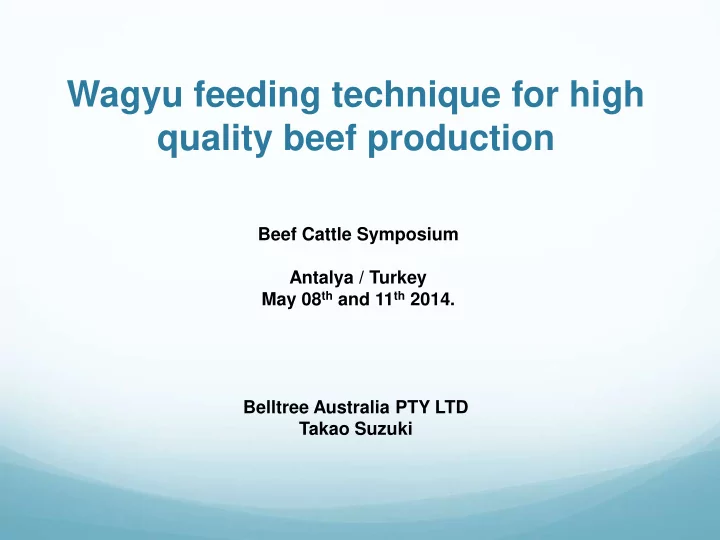

Wagyu feeding technique for high quality beef production Beef Cattle Symposium Antalya / Turkey May 08 th and 11 th 2014. Belltree Australia PTY LTD Takao Suzuki
Farm Location Blue Mountains – 100km west of Sydney
Belltree Australia Operation Fullblood Wagyu Breeding : 70 head Fullblood Wagyu Feeding : 80 head Angus F1 production : 40 head
Work Experience Dairy farm in Japan 1997 Japanese feedlot (7,500head) 1990 ~ 1991 Australian feedlot (35,000head) 1991 ~ 2006 Establish Belltree Australia PTY LTD in Blue mountains 2007 ~
What is Wagyu? The word ‘ wagyu ’ is a Japanese-language ‘ wa-gyu ’ , which simply means ‘Japanese produced beef cattle’. It does not describe any single breed. Japanese Black >90% of Wagyu trade in Japan Japanese Black Japanese Brown Japanese Shorthorn
Beef Production Trend in Japan Beef Cattle Slaughter Number in Japan 900,000 800,000 689,101 700,000 No Hd Slaughtered 600,000 571,405 539,877 500,000 400,000 404,473 300,000 200,000 226,541 224,932 100,000 0 2001 2002 2003 2004 2005 2006 2007 2008 2009 2010 2011 2012 2013 F1 Slaughter Number Wagyu Slaughter Number Holstein Slaughter Number
Beef Retail Price in Japan JPY/100g Wagyu F1 Holstein 617 441 299 Chuck 616 464 313 Brisket 1,157 844 599 Sirloin 602 439 332 Butts
Australian Wagyu Semen & embryos exported from Japan to USA in 1995 Wagyu livestock and semen were imported from USA to AUS from 1996~ “ Wagyu ” infused cattle feeding is popular through domestic/export market Wagyu is registered to Australian Wagyu Association database with DNA profile Mainly feeding at western style feedlot or grass fed
Wagyu Beef
Wagyu Beef
Wagyu Beef Characteristics Marbling – Intramuscular Fat Fatty Acid Composition High MUFA (Approx >53%) High Oleic Acid (18:1) Low Melting Point (<26 ℃ ) Texture – Firm Tender Unique Flavor
Wagyu Production
Japanese Style Feeding
Japanese Style Feeding Total growth management to meet nutritional requirements of cattle at each stage Specially formulated ration Selected feed ingredients for fatty acid composition and flavor Feeding up to 30 month old Minimize cattle stress Managing small group
Feed Ration - Pre/Post weaning CP ~ 22% TDN 78% ADF 14% Ad-rib Hay Feeding Target Consumption 0.5 ~ 2kg - Post Weaning ~ 13 month Old CP ~16% TDN 76 ~ 78% ADF 12% High Roughage Contents(Pasture Hay, Alfalfa etc) Target consumption 2 ~ 6kg (60% Ration, 40% Hay) - 14 ~ 30 month old CP ~12% TDN 78%+ ADF 12.5% Roughage with No Vitamin A (Straw) High Grain Contents (70% +) Target consumption 7 ~ 10kg (80% Ration, 20% Straw)
Example of Wagyu Feed Ingredients Barley – High Crude Fibre Steam Flaked – High Digestibility Corn – High Energy, Good Fat Steam Flaked – High Digestibility Hominy Feed – High Crude Fiber
Example of Waguyu Feed Ingredients Soybean Meal – high in lysine Canola Meal
Example of Wagyu Feed Ingredients Wheat Bran – High Fiber OKARA (By-Products of Soy Milk) – High Crude Protein Nuts Husk – High Fiber Barley Husk – High Fiber
Example of Wagyu Feed Ingredients Salt – Balance Mineral Lime Stone – Balance out P : Ca to 1 : 2 (prevention of Kidney Stone)
Example of Wagyu Feed Ingredients Grasses Hay (Ryegrass, Bermuda ) Soft fiber and easy to digest Alfalfa Hay (Lucerne) High CP, Rich in Vitamin A Rice Straw/ Wheat Straw High Fiber No Vitamin A
Example of Wagyu Feed Ration Starter Grower Finisher Corn 25.00% 22.00% 35.00% Barley 25.00% 22.00% 25.00% Wheat Bran 10.00% 15.00% 19.00% Soybean Meal 13.00% 11.00% 8.00% Barley Straw 0.00% 7.00% 0.00% Nuts Husk 0.00% 0.00% 3.00% Alfalfa 15.00% 7.00% 0.00% Alfalfa Meal 10.00% 10.00% 0.00% Wheat Straw 0.00% 4.00% 4.00% Wheat Husk 0.00% 0.00% 4.00% Limestone 1.00% 1.00% 1.00% Salt 1.00% 1.00% 1.00% **The rations are example only
Feeding Program 0 – 3 month – Grazing/ Starter Ration Early weaning to ensure their growth and getting ready for grain feeding program
Feeding Program 3 – 13 month – Weaners/ Grower Ration + Hay Ensure the roughage consumption to develop rumen size and muscle growth
Feeding Program 14 – 30 month – Feeders/ Finisher Ration + Rice Straw Restrict Vitamin A consumption and maximize feed consumption until last minutes to develop marbling
Why Japanese Style?? Managing animal in small group Minimize variation in feed consumption Managing by age group to control ration changes Managing animal in shed Minimize stress of environment effect Minimize feed wastage Japanese Style Feed Ration Maximize marbling ability Maximize eating quality by control fatty acid composition (MUFA : BMW 57.1% VS Angus 49.6 )
Key Point of Wagyu Feeding Early weaning and supplement nutrition is essential for Wagyu calf growth because milk production of Wagyu cow is limited. Muscle development at young age will determine beef yield Rumen conditioning at post weaning age (4 ~ 9month old) is essential to enhance high feed consumption for later stage Roughage consumption will increase rumen sizes and maintaining rumen bacteria population Maintaining feed consumption as long as possible is key to increase marbling score. Irregular feed consumption will induce gastrointestinal problem and hence low meat quality.
Recommend
More recommend